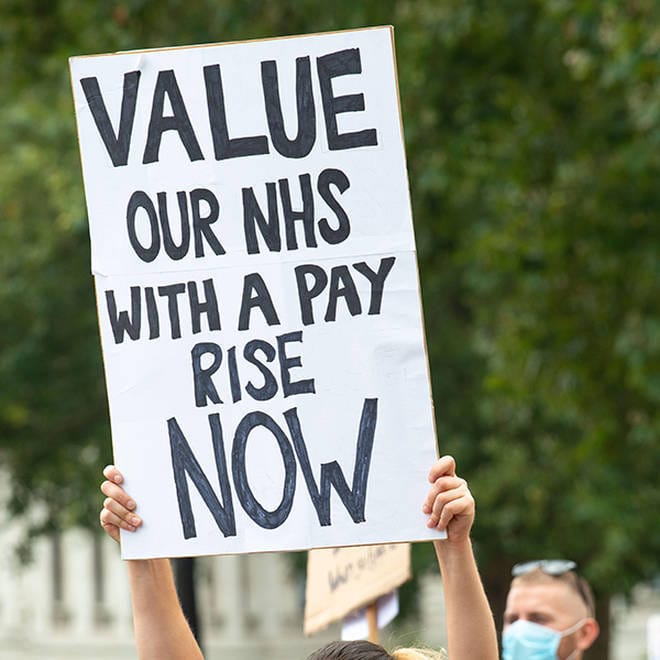The NHS is on the Verge of Collapse

By Hiba Ul-Hasan, BA History
The National Health Service (NHS) has been experiencing one of its most serious crises since its founding in 1948. Along with rising living costs due to inflation, the NHS is on its last legs, attempting to meet increasing demands.
The NHS has had a shortage of medical professionals, a lack of resources during the COVID-19 pandemic, increased A&E wait times, cancellation of scheduled surgeries, and longer waiting lists in recent years.
During the pandemic, the NHS bore the weight of the Coronavirus. Due to the large number of patients who required life-saving treatment and support, entire hospital wings were filled with patients infected by COVID. The development of the seven Nightingale hospitals, with the ExCeL convention centre providing 500 intensive care beds, was intended to relieve pressures on the NHS and to alleviate the struggle for hospital beds.
But a poll of 1007 participants performed in April 2020 revealed that two-thirds of staff respondents thought there was a shortage of PPE accessible and that only half believed frontline workers had received adequate training. 90% of interviewees felt that a call for a lockdown early would have reduced the spread of the virus.
Even before the pandemic took place, the NHS had a huge number of staff vacancies, and millions of people were on treatment waiting lists. There were few GP appointments available due to a shortage of medical staff, prompting individuals to go to A&E in the hope of being seen by a medical expert. According to the RCEM, the average reported waiting time at the A&E is 12 hours before being discharged, affecting 4.3% of patients seeking emergency care in 2021.
As a result, according to the most recent BSA study, public satisfaction with the NHS declined by 17% between 2020 and 2021, reaching 36%. This was the lowest recorded score since 1997, as well as the largest year-on-year reduction in history.
However, this did not imply that the public did not value the work of the NHS. The weekly ‘Clap for Carers’ showered public appreciation on frontline employees. According to the Common Public Account Committee, 80% of the general public recognised the NHS as having a ‘serious’ or ‘severe’ financing problem.
The report also alleges that the government has been underinvesting by not financing the NHS in accordance with the growing demand and by making jobs unappealing by overworking and underpaying employees. According to the Common Public Account Committee’s research, the UK health department was too quick to give Covid contracts, citing the £37 billion failed test-and-trace system as an example, which is attributed to the Conservative Party’s intention to privatise the health care system.
Multiple strikes have occurred in recent months as the GMB and UNISON unions demanded pay increases above inflation. Despite the government’s provision of a 4.75% pay increase for all NHS employees, the latest figures show that it is less than half of the current inflation rate. As a result, for the first time, the Royal College of Nursing (RCN) is going on strike, and ambulance workers are expected to join them.
“Prime Minster Rishi Sunak … claimed the government was ‘rapidly implementing measures…to relieve pressure in urgent and emergency care department.'”
Labour leader Sir Keir Starmer demanded that the Prime Minister bear some responsibility for the NHS crisis during one of the Prime Minister’s Questions sessions in the House of Commons. Prime Minister Rishi Sunak accused Labour leader Keir Starmer of opposing anti-strike legislation, claiming the government was ‘rapidly implementing measures…to relieve pressure in urgent and emergency care departments.’
Sir Keir told BBC’s Laura Kuenssberg that it would take at least a decade for his party to repair the current NHS crisis and tackle the economic catastrophe. He stated that in order to continue the public service that the NHS delivers, the private sector may need to be used.
Photo Caption: NHS Strikes continue with demands for better pay and working conditions (Credit: LBC/Alamy).




